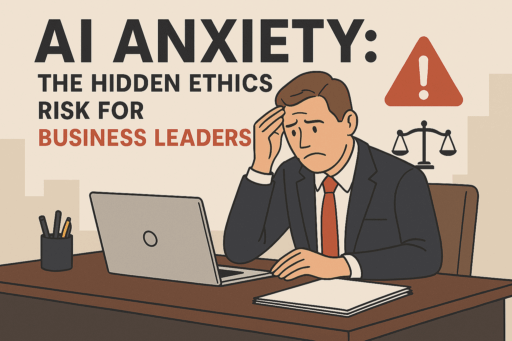AI Anxiety: The Hidden Ethics Risk for Business Leaders
Why it matters: As AI adoption accelerates, employees are asking: “Will this take my job?” That anxiety isn’t just a morale issue—it’s an ethics risk. Research shows job insecurity can push even good employees toward unethical behavior. Here’s what the evidence says and what leaders can do.
What the Research Shows
- Job Insecurity → Emotional Exhaustion → Unethical Behavior
Job insecurity acts as a stressor that drains employees’ emotional and cognitive resources. When workers feel uncertain about their future, they experience emotional exhaustion, which can lead to counterproductive or unethical behaviors. This isn’t about bad character—it’s about depleted self-control under stress.
“Job insecurity is one of top concerns in the contemporary workplace, which significantly affects emotional exhaustion and workplace deviance.”
Source: Jia, Liao & Yin (2022), Frontiers in Public Health
Read the study
- Fear of Job Loss Spurs “Unethical Helping”
Job insecurity doesn’t always lead to self-serving misconduct. Sometimes, employees engage in unethical acts to help the organization—known as Unethical Pro-Organizational Behavior (UPB). For example, they might misreport data to make the company look good, hoping this secures their position.
“Empirical results show that: (1) Quantitative job insecurity has a significant positive effect on UPB, while positive effect of qualitative job insecurity on UPB is insignificant. (2) Quantitative job insecurity positively affects impression management motivation and increases UPB.”
Source: Xu, Wen & Wang (2022), Frontiers in Psychology
Read the study
- AI-Specific Risk: Fear of Replacement → Deviant Behavior
AI introduces a new dimension of job insecurity: fear of being replaced by technology. This stress can lead to deviant behaviors—both against the organization and against colleagues—as employees struggle to cope with perceived threats.
“The findings indicate that the risk of job substitution by AI positively influences both interpersonal deviant behavior and organizational deviant behavior among employees.”
Source: Zhao (2025), Information Development
Read the study
Why Leaders Should Care
- AI anxiety is widespread. APA reports that 38% of U.S. workers worry AI could make some or all of their duties obsolete (APA report).
- Employees fear job loss from AI. EY’s AI Anxiety in Business Survey found 65% of employees are anxious about AI replacing their job, and 75% worry AI will make certain jobs obsolete (EY report)[1].
Five Actions for Business Leaders
- Communicate early and often
Uncertainty is the biggest driver of anxiety. When employees don’t know how AI will affect their roles, they often assume the worst. This fear can lead to disengagement or even unethical shortcuts to appear indispensable. Leaders should proactively share what AI adoption means for the organization—where it will be applied, what tasks it will automate, and what roles will remain critical. Regular updates, Q&A sessions, and transparent timelines help employees feel informed and reduce the rumor mill that fuels insecurity.
- Upskill for digital confidence
Fear of being replaced often stems from feeling unprepared for new technology. By investing in AI literacy and digital skills training, leaders can shift the narrative from “AI will take my job” to “AI will help me do my job better.” Research shows that higher digital self-efficacy reduces stress and lowers the likelihood of deviant behavior. Offer hands-on workshops, microlearning modules, and mentorship programs so employees feel capable and future-ready.
- Reinforce ethical guardrails
When employees feel pressured to prove their value, they may cut corners or engage in “unethical helping” to make the company look good. Leaders can counter this by making ethics a visible priority. Update policies to address AI-related risks (e.g., data integrity, bias, transparency) and ensure performance metrics reward integrity, not just speed or output. Recognize and celebrate ethical decision-making so employees see that doing the right thing is part of winning.
- Support well-being
Job insecurity is emotionally draining. Exhausted employees are more likely to make poor decisions because stress depletes self-control. Leaders should monitor workloads, encourage time off, and provide access to mental health resources. Simple steps—like manager check-ins, flexible scheduling, and employee assistance programs—signal that the organization values people, not just productivity. A healthy workforce is more resilient and less vulnerable to ethical lapses.
- Strengthen speak-up systems
Even with strong policies, issues will arise. Employees need safe, confidential ways to report concerns—especially when AI introduces new gray areas. A robust speak-up system includes an anonymous hotline, anti-retaliation protections, and clear follow-up processes. Promote these channels regularly so employees know where to turn. When leaders respond quickly and fairly to reports, it builds trust and reinforces a culture of accountability.
Bottom Line
AI can be a competitive advantage—but unmanaged fear can erode culture and compliance. Leaders who address AI anxiety head-on and double down on ethics infrastructure will protect both their people and their brand.
Learn how we, as a hotline services provider, can help you. Contact us.
Reach Us
Red Flag Reporting
P.O. Box 4230, Akron, Ohio 44321
Tel: 877-676-6551
Fax: 330-572-8146




